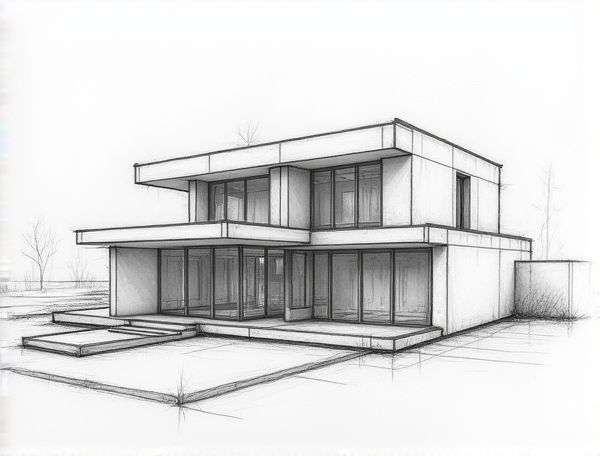
Photo illustration: Bauhaus home design with modular wall systems
Embracing Bauhaus home design with modular wall systems enhances Your space through clean lines, functional layouts, and adaptable partitions that maximize both style and efficiency. Explore the article to discover how these innovative walls redefine modern living spaces.
Introduction to Bauhaus Home Design Principles
Bauhaus home design principles emphasize functionality, simplicity, and the seamless integration of art and technology to create efficient living spaces. You benefit from clean lines, geometric shapes, and open floor plans that maximize natural light and promote a sense of order. This approach prioritizes minimalist aesthetics and practical materials, ensuring both elegance and comfort in your home.
Evolution of Modular Wall Systems in Architecture
Modular wall systems in architecture have evolved significantly, incorporating advanced materials like high-performance composites and sustainable elements to enhance energy efficiency and design flexibility. Your home benefits from these innovations through faster construction times, improved structural integrity, and customizable aesthetic options that adapt to modern living requirements.
Key Features of Bauhaus-Inspired Interiors
Bauhaus-inspired interiors emphasize functional design, clean lines, and a minimalist aesthetic that integrates art and technology seamlessly. Key features include open floor plans, geometric shapes, the use of industrial materials like steel and glass, and a neutral color palette accented with primary colors to create a balanced, modern living space.
Benefits of Modular Wall Systems in Modern Homes
Modular wall systems in modern homes offer enhanced flexibility, allowing easy customization and reconfiguration to suit evolving spatial needs while improving construction speed by reducing on-site labor. These systems also provide superior insulation, soundproofing, and sustainable material options, contributing to energy efficiency and eco-friendly living environments.
Materials and Textures Common in Bauhaus Design
Bauhaus design prominently features materials such as steel, glass, concrete, and wood, emphasizing functionality and simplicity. Textures are typically smooth and sleek, showcasing industrial finishes like polished metal and clear glass that highlight clean lines. This combination of materials and textures creates a harmonious balance between durability and modern aesthetic appeal.
Integrating Functionality with Aesthetics
Seamlessly integrating functionality with aesthetics in home design enhances your living space by combining practical layouts, ergonomic furniture, and visually appealing elements such as color harmony and textures. Prioritizing both utility and beauty ensures your home not only looks stunning but also supports daily activities efficiently.
Customizing Spaces with Modular Partitions
Modular partitions offer versatile solutions for customizing spaces, allowing you to easily reconfigure layouts without major construction. These partitions maximize functionality and aesthetics by adapting to your unique design needs and room dimensions. Incorporating modular partitions enhances privacy while maintaining an open, airy atmosphere in your home.
Sustainable Solutions in Bauhaus Modular Systems
Bauhaus modular systems prioritize sustainable solutions by integrating eco-friendly materials such as recycled steel and low-VOC composites that reduce environmental impact. These systems optimize energy efficiency through passive solar design, advanced insulation, and smart ventilation, minimizing heating and cooling demands. Modular construction techniques also reduce waste and allow for efficient transportation, supporting a greener, more sustainable home design.
Case Studies: Bauhaus Homes with Modular Walls
Bauhaus homes with modular walls showcase innovative spatial flexibility, enabling rapid reconfiguration of living areas to maximize functional use and adapt to occupants' changing needs. These case studies highlight energy efficiency improvements and minimalist aesthetics achieved through standardized modular components that streamline construction and reduce material waste.
Future Trends in Bauhaus and Modular Home Design
Future trends in Bauhaus and modular home design emphasize sustainability and smart technology integration, enhancing functionality and energy efficiency. Modular components now allow for greater customization, adaptability, and rapid construction without compromising the iconic minimalist aesthetics of Bauhaus principles. Your home can seamlessly blend modern innovation with timeless design, ensuring long-term value and comfort.
 homedesy.com
homedesy.com